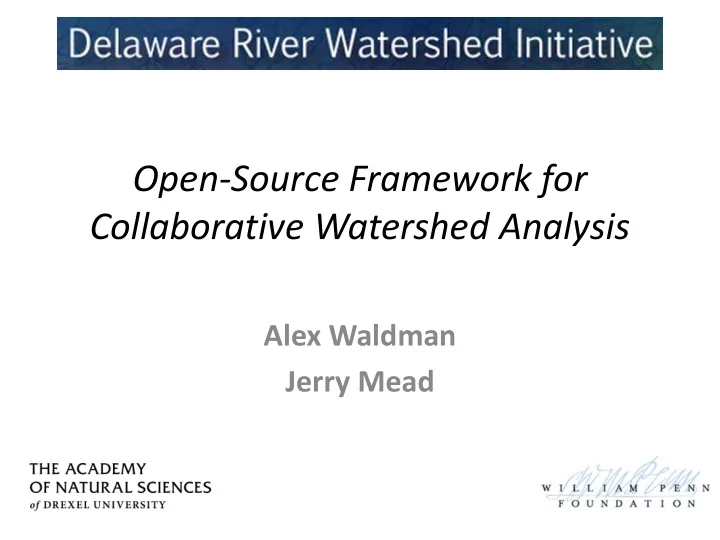

Open-Source Framework for Collaborative Watershed Analysis Alex Waldman Jerry Mead
Roles of Models Coordinated Adaptive in Watershed Analysis Watershed Analysis • Research dynamics affecting • Integrated Research water conditions • Standardized Data • Predict (estimate) water conditions (in un-monitored Automated Analysis • locations in space or time) • Open-source collaborative development • Inform policy/investment – i.e. standardized component decisions w.r.t. restoration, models conservation, TMDLs, etc. Dynamic user-feedback • – AND Monitoring Strategy!
A Problem with Scale • Low-rez Basin-wide vs. high-rez site/micro-shed analysis • Computational limitations • Data resolution / uncertainty • Know-how
The StreamHiker Approach Lateral Drainage Areas Delineated Split into 200 m long reaches
Hillslope Spatial Components Channel Width Hillslope Interval Riparian Zone
Network Tables
Spatial Datasets Overlaid & Aggregated at Various Scales • Aggregation scales: • Types of data: – Drainage area – Anything with a spatial reference • Upstream drainage area • Reach lateral drainage – Environmental area conditions: • Confluence lateral • Topography drainage area • Landcover • Upstream distance • Soils interval lateral drainage area • Geology – Riparian Zone • Climate • Point sources – Hillslope Intervals – Monitoring data – Left/Right Bank – Model outputs
~ 200m Reach Lateral Drainage Areas arranged by Upstream Junction • Relatable to confluence-scale data / models, i.e. • EPA SPARROW • NHD Plus, etc.
Open-source: Hosted on GitHub
Canopy Cover within Riparian Zone • Geo-spatial data management services –
% Canopy Cover in Riparian Zone USGS Gauge # 1417500 @ EAST BR DELAWARE RIVER AT HARVARD NY % Impervious Surface in Riparian Zone 70 60 50 40 30 20 10 0 0 20 40 60 80 100 120 -10 Distance Upstream (km)
Nutrient Load Estimates (MapShed) at HUC-12 Scale ~Extrapolated to Reach Scale
Next Steps • Continue packaging StreamHiker tools as stand-alone package hosted on GitHub • Incorporate into ANSDU data management system (develop interactive mapping and data access tools) • Statistical models – i.e. Stream temperature – Decay functions w.r.t. upstream distance – Cascading downstream models (i.e. SPARROW) • Facilitate usage/get feedback from project partners
Alex Waldman amw47@drexel.edu GitHub page: http://ansdu-patrick-center.github.io/
Recommend
More recommend